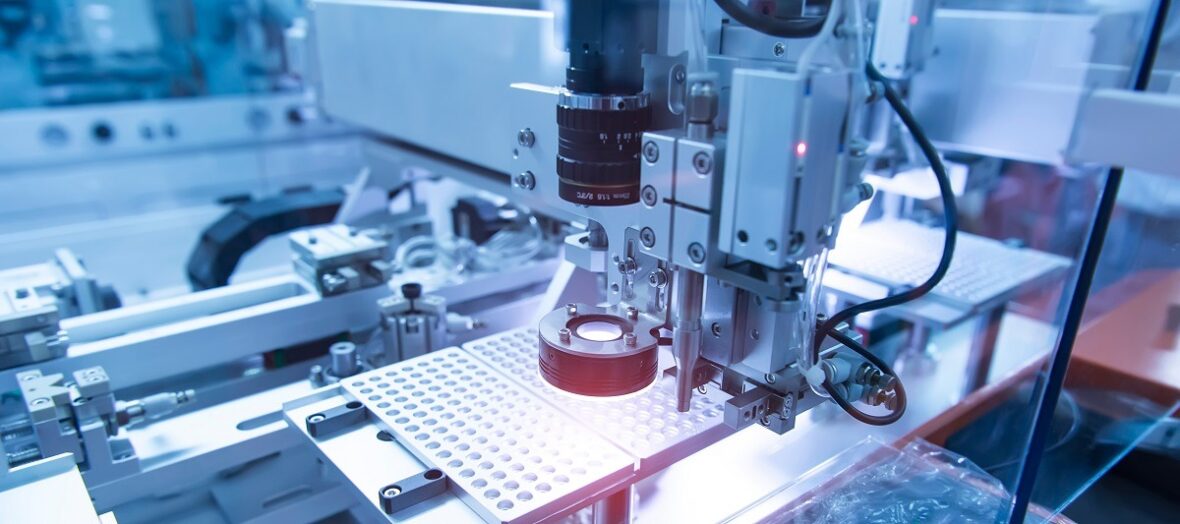Manufacturers today face a big challenge: staying ahead in a fast-moving world. One key fact stands out – the IIoT boosts productivity and gives better insights with AI, making factories smarter.
This article shows how advanced sensor connectivity solutions are changing the game by providing real-time data for better decisions. Read on to learn how this can work for you.
The Evolution of Manufacturing Technology
Manufacturing technology is evolving rapidly with the integration of AI, digital twins, generative AI, industrial cybersecurity, and sustainability initiatives. Smart sensors, IIoT and AI applications, data analytics for actionable insights are shaping the future of manufacturing.
The role of AI
Artificial intelligence (AI) is revolutionizing factory operations, making machinery more intelligent and enabling industry leaders to make informed decisions through data analysis.
It employs techniques like machine learning to interpret vast amounts of information from sensors and devices quickly. This capability allows companies to identify potential issues early on, minimizing downtime.
Moreover, AI is paving the way for innovative business methods by transforming data into actionable insights. Leveraging technologies such as cloud-based solutions and smart transportation systems enhances supply chains and production processes.
This improvement in operations leads to better-quality products and increased customer satisfaction. Through the adoption of AI, manufacturing processes become more streamlined and prepared to meet future demands.
Digital twins
Digital twins act as virtual representations of real-world manufacturing systems or equipment. These sophisticated simulations enable businesses to peek into their production processes and refine their operations.
By duplicating physical assets in a digital space, companies can forecast how machinery will react under different scenarios, identify potential issues before they happen, and suggest ways to boost efficiency.
This technology plays a crucial role in smart manufacturing, assisting firms in optimizing their supply chains, improving machine performance, and promoting sustainability by cutting down the need for physical prototypes.
With digital twins, manufacturers can carry out condition monitoring and predictive maintenance more efficiently. They mimic real-life conditions without the risks or costs tied to actual tests, making them essential tools for decision-making in Industry 4.0 settings.
Through these vibrant replicas, businesses unlock insights that lead to better product life cycle management and strategic planning. Digital twins mark a significant advancement in our understanding and engagement with industrial systems—ensuring production lines are more dependable and prepared for upcoming challenges.
Generative AI
Generative AI is making big changes in how factories work and grow. Companies like PFA Inc. use this smart tech to get better at making things, fixing machines before they break, and designing products faster.
Generative AI helps turn ideas into real-world solutions quicker by learning from lots of data and figuring out the best ways to do things. This means making everything from tiny sensors to huge machines can be more efficient and cost-effective.
In the world of manufacturing, staying ahead means always looking for ways to improve. With generative AI, businesses are finding new paths to smarter factories and smoother supply chains.
This powerful technology reshapes how we handle design, optimization, and automation challenges head-on. Next up, let’s explore why protecting these advances with industrial cybersecurity matters more than ever.
Industrial cybersecurity
Industrial cybersecurity is crucial in the manufacturing industry as computer systems and technology become more essential. The sector encounters cybersecurity challenges due to the continued use of legacy processes and equipment, making innovative approaches necessary to protect sensitive information within manufacturing processes.
Cybersecurity standards, information security, and strong security measures are vital for safeguarding data integrity and ensuring operational continuity.
Manufacturers should prioritize industrial cybersecurity measures to minimize cyber threats and secure their operations against potential breaches.
Sustainability
Sustainability in manufacturing is no longer an afterthought; it’s essential for the future. Industry 4.0 technologies, like Internet of Things (IoT) devices, are powering smart factories to prioritize conservation and efficiency.
This digital transformation supports environmental sustainability by integrating technology with green practices and resource-efficient processes. Here at PFA Inc., we focus on building sustainable supply chains that prioritize resilience, agility, and competitiveness through our innovative solutions.
Our emphasis on Sustainability 4.0 aligns with evolving trends toward a more eco-friendly approach to industrial operations. It will change the landscape with foundational technologies that solidify the role of IoT and AI in promoting sustainability across manufacturing sectors.
How Connectivity and Data are Transforming Manufacturing
Connectivity and data are revolutionizing manufacturing with the integration of IIoT, digital application solutions, and smart sensors. This technological advancement ensures real-time insights and smarter decision-making for enhanced efficiency in manufacturing processes.
IIoT and AI
Industry 4.0 relies on the adoption of IIoT and AI by manufacturers. This integration breaks down data silos, enabling greater connectivity and actionable insights from real-time data analytics.
Implementing IIoT requires collaboration between IT and OT, which necessitates new tech investments and a shift in manufacturing mindset.
Digital application solutions
Digital application solutions are essential for modern manufacturing. These advanced tools integrate with the industrial Internet of Things (IIoT) and AI to streamline processes and enhance productivity.
Smart sensors, data analytics, and IO-Link connectivity enable real-time insights into operational performance, contributing to smarter decision-making and increased efficiency within the manufacturing environment.
Manufacturing businesses can leverage these digital solutions from PFA Inc. to unlock the potential of Industry 4.0 and gain a competitive edge in the ever-evolving landscape of smart manufacturing.
The integration of digital application solutions with IIoT technology reflects a pivotal shift in modern manufacturing dynamics, enabling businesses to drive continuous improvement while staying ahead in an increasingly interconnected industry.
Smart sensors
The crucial role of smart sensors in manufacturing fuels connectivity and empowers industries worldwide. When combined with IoT, these sensors transform the way manufacturers collect and communicate data.
They play a pivotal role in adapting to advanced technologies based on the fusion of data and enabling proactive maintenance. Through connected sensor technology, manufacturers can effectively address performance issues before they impact entire assembly lines.
Furthermore, IoT augments the use of these sensors, converting manufacturing process parameters into digital data for analysis.
Smart sensor technology offers business owners actionable insights that drive productivity gains and better information through AI-powered future-proofing strategies.
The importance of IO-Link
IO-Link serves a crucial function in industrial manufacturing by delivering more precise data from machines and eliminating the need to scale analog signals. It extracts greater information from low-level devices across various manufacturing environments, propelling us towards a smarter and more connected future.
IO-Link not only offers increased productivity and better insights through AI but also links sensors and actuators to advanced controllers like PLCs.
This sophisticated sensor connectivity solution is designed to improve operational efficiency, reliability, and performance on the factory floor. By harnessing IO-Link, manufacturers can access actionable insights that drive smarter manufacturing decisions while ensuring seamless communication between sensors and controllers.
Data analytics for actionable insights
Utilizing data analytics in manufacturing can transform intricate data into practical insights, driving efficiency and innovation. Manufacturers can leverage IIoT and AI to acquire real-time insights for process improvements, predictive maintenance, and enhanced operational efficiency.
Small to medium-sized manufacturers can enhance their productivity and quality through well-informed decision-making based on statistical trends and future predictions. Predictive maintenance derived from data analytics helps prevent breakdowns by predicting potential equipment failures, ultimately optimizing production processes.
The Future of Manufacturing: Autonomous Production
Advanced sensor connectivity solutions are driving the future of manufacturing towards autonomous production. The evolution includes advancements in autonomous technology to enhance efficiency and productivity.
Advancements in autonomous technology
Transforming manufacturing, autonomous technology offers increased flexibility and scalability to meet high demand. Using developments in machine learning, artificial intelligence, big data, mobility, and advanced sensors for logistics has led to the exploration of autonomous plants.
These advances promise solutions for the future of manufacturing by linking technology, data, and advanced visualizations with operations. Industry 4.0 technologies capture and analyze manufacturing processes through IoT edge sensors coupled with AI algorithms – essential advancements for the future of manufacturing.
Moving forward into «Future-Proofing Manufacturing for Industry 4.0,» businesses can take advantage of connectivity and configurability along with security measures to strengthen their infrastructure.
Related resources and updates
Manufacturers can stay updated on the latest technologies and advancements in Industry 4.0 by exploring resources from PFA Inc. The company offers insights into how AI, IoT, and cloud technology are transforming manufacturing processes.
Business owners can discover practical ways to implement intelligent production solutions for increased efficiency and productivity, such as IIoT edge sensors that gather valuable data and innovative cloud platforms supporting advanced capabilities.
These resources will equip business owners with the knowledge needed to navigate the ever-evolving landscape of smart factories. By understanding the importance of collaboration between AI and IoT, leveraging connectivity tools like smart sensors and IIoT applications becomes an achievable goal for businesses striving to future-proof their manufacturing operations.
Explore these valuable resources from PFA Inc., providing actionable insights into cutting-edge connectivity solutions that underpin sustainable growth in manufacturing. Next – Future-Proofing Manufacturing: Autonomous Production.
Future-Proofing Manufacturing for Industry 4. 0
Future-proofing manufacturing for Industry 4.0 requires integrating cutting-edge solutions and embracing digital transformation. Enhancing connectivity, security measures, and adopting private cellular technology play a pivotal role in preparing the manufacturing sector for the era of smart factories and autonomous production.
Connectivity and configurability
Connectivity and configurability are essential for seamless integration in manufacturing processes. By leveraging advanced sensor connectivity solutions, businesses like PFA Inc. can optimize their production environments for better performance and efficiency.
The use of private cellular technology enables secure data transmission and real-time monitoring, ensuring that the entire production ecosystem operates smoothly and adapts to changing demands.
The future of manufacturing lies in smart, interconnected systems that can easily adapt to new challenges while maintaining high levels of productivity. As businesses like PFA Inc.
continue to embrace Industry 4.0 technologies, the emphasis on connectivity and configurability will play a pivotal role in achieving sustainable growth and competitiveness in the market.
Moving forward, let’s explore how security measures further fortify these advancements towards autonomous production.
Security measures
To secure manufacturing control points in the Industry 4.0 era, it is vital to deploy advanced solutions that can identify and address sophisticated attacks effectively. Implementing robust security measures allows PFA Inc.
and other manufacturers to acquire real-time data, streamline operations, and enhance decision-making processes. Therefore, embracing cybersecurity strategies tailored for Industry 4.0 not only safeguards crucial control points but also propels businesses towards increased operational efficiency and informed decision-making.
By prioritizing security measures aligned with the requirements of Industry 4.0, such as advanced attack detection and timely remediation, PFA Inc., alongside other manufacturers, can fortify their operational frameworks against potential cyber threats while maximizing the benefits of real-time data analysis for optimizing production workflows.
The benefits of private cellular technology
Private cellular technology offers significant benefits for manufacturing operations. Private LTE networks, such as those provided by PFA Inc., revolutionize connected manufacturing and offer solutions for supply chain disruption and data security.
These networks also enable advanced technologies like self-driving machines, collaborative mobile robots, and AGVs. Private 5G networks are another valuable asset in this realm, facilitating the seamless connection of IoT sensors, cameras, autonomous equipment, and drones on one network without constraints imposed by public networks.
Manufacturers can leverage private cellular technology to enhance their Industry 4.0 initiatives. These technologies improve connectivity within manufacturing facilities, empowering operators to make timely decisions that drive efficiency and productivity.
Additionally, while private 4G LTE deployments remain a viable alternative for basic wireless connectivity needs in the short term or to complement existing infrastructure such as wired or Wi-Fi setups.
Solutions from MOXA
Industrial network solutions are offered by MOXA to meet current and future business needs. Their next-generation networking portfolio addresses the challenges of future-proofing industrial networks, aiming to digitally connect factories and enhance flexibility, efficiency, and throughput.
Reliable industrial networking solutions are provided to leading manufacturers in over 70 countries worldwide as part of their commitment to empowering the 4th Industrial Revolution.
The importance of futureproof networks for seamless communication and increased efficiency
Futureproof networks play a crucial role in ensuring seamless communication and increasing efficiency in manufacturing. By leveraging these advanced connectivity solutions, businesses like PFA Inc.
can build unified IT/OT networks, boosting system reliability and overall productivity. These future-ready networks pave the way for optimized workflows by facilitating machine-to-machine communication, ultimately driving enhanced operational efficiency within smart manufacturing environments.
Transitioning to ever-evolving Industry 4.0 standards demands concerted efforts towards futureproofing manufacturing systems through robust connectivity measures. With such promising advancements, business owners can confidently embrace the transformation toward an interconnected and efficient industrial landscape.
Conclusion
Future-proofing manufacturing through advanced sensor connectivity solutions is crucial for staying competitive in today’s ever-evolving industry. Embracing AI, IoT, and cutting-edge technologies not only enhances productivity but also unlocks the secrets to streamlined operations.
PFA Inc.’s futureproof industrial network solutions are designed to cater to businesses’ current and future needs in the realm of Industry 4.0, providing robust infrastructure that underpins seamless communication and increased efficiency without compromise on security measures.
FAQs
1. What does «future-proofing manufacturing» mean?
Future-proofing manufacturing means using advanced technologies like sensor connectivity, cloud infrastructure, and robotics to make sure factories can adapt to new challenges. This includes dealing with supply chain disruptions and keeping up with the latest cybersecurity measures.
2. How do sensors improve manufacturing processes?
Sensors collect data in real time from machines and products on the factory floor. This data helps in automating processes, monitoring the condition of equipment, and ensuring everything runs smoothly. It’s all about making factories smarter through industrial automation.
3. Can advanced sensor connectivity help with supply chain issues?
Yes, by providing accurate data on inventories and production schedules, advanced sensor connectivity solutions enable better planning and coordination with suppliers. This helps reduce delays caused by global supply chain problems or a chip shortage.
4. Why is cloud security important for modern manufacturing plants?
Cloud security ensures that all the data collected from sensors and shared across networks is safe from cyberthreats. Secure cloud services are crucial for protecting sensitive information related to fabrication plants, their suppliers, and customers.
5. How do augmented reality (AR) and mixed reality (MR) fit into manufacturing?
AR and MR technologies let workers simulate operations or see additional digital information overlaid on real-world objects. These tools are great for training purposes or guiding workers through complex tasks without risking mistakes during fabrication.
6. What role does PFA Inc play in advancing sensor connectivity solutions in manufacturing?
PFA Inc provides key components necessary for building an interconnected system of sensors within a factory setting—enhancing operational technology capabilities such as telemetry dashboards that display vital statistics needed for asset management.


